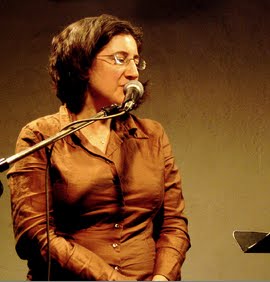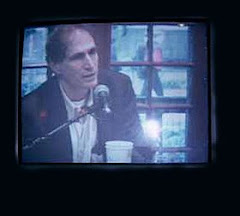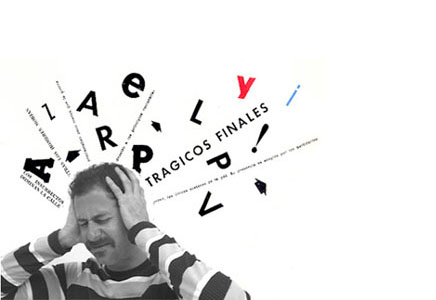
In PT #21 we talk about a poem by Charles Bernstein written in 2002, published in World on Fire and eventually collected in Girly Man: "In a Restless World Like This Is." As Marcella Durand informs the PoemTalkers, the title is taken from the lyrics of a sweet 1940s song, sung later by Nat King Cole, Doris Day, et alia. Why derive the title from so sentimental a source? Hank Lazer and Marcella each speculate: it's the postwar thing, bitter-sweet, looking simultaneously forward and back, done with it but still needing the balm. Okay, but why now, here--why in this poem?
It's a post-9/11 poem. Eli Goldblatt describes for us Bernstein's initial written responses to 9/11, providing us a context for this poem's unstraightforward all-preamble going-nowhere-ness. Al asserts the obvious: the poem enacts the restlessness the speaker feels: linguistically, tonally, idiomatically. The "no" of the fourth line is one of those staring-over words, as is, of course, "well" in line 8. The poem gives us an alternative "way" or path from the (non)start of its opening to the (non)finish of its ending. It is the opposite of an A->Z poem. There is not a single direction, not a point, and, needless to say--ah, but we at PoemTalk say it!--that is its point.
 Where are we going? What is going to happen next? Is it narratively possible to discern ("Not long ago" is story-telling phrasing)? Ah, but "maybe I dreamt it / Or made it up, or have suddenly lost / Track of its train." If you decide you need to go "In one direction" only, you'll find--note the contorted, merged idiomatic language--that "you'll / Have to go on before the way back has / Become totally indivisible." The final word, the PoemTalkers agree, is a national word--a term from the pledge of allegiance to the United States of America, yet a notion that counters rather than abets the concept of discrete parts, clear paths, moving along the road from regress to progress.
Where are we going? What is going to happen next? Is it narratively possible to discern ("Not long ago" is story-telling phrasing)? Ah, but "maybe I dreamt it / Or made it up, or have suddenly lost / Track of its train." If you decide you need to go "In one direction" only, you'll find--note the contorted, merged idiomatic language--that "you'll / Have to go on before the way back has / Become totally indivisible." The final word, the PoemTalkers agree, is a national word--a term from the pledge of allegiance to the United States of America, yet a notion that counters rather than abets the concept of discrete parts, clear paths, moving along the road from regress to progress.In a Restless World Like This Is
Not long ago, or maybe I dreamt it
Or made it up, or have suddenly lost
Track of its train in the hocus pocus
Of the dissolving days; no, if I bend
The turn around the corner, come at it
From all three sides at once, or bounce the ball
Against all manner of bleary-eyed fortune
Tellers--well, you can see for yourselves there's
Nothing up my sleeves, or notice even
Rocks occasionally break if enough
Pressure is applied. As far as you go
In one direction, all the further you'll
Have to go on before the way back has
Become totally indivisible.
Our recording of the poem was made during a moving outdoor reading in September 2003 at the Kelly Writers House. It and all PoemTalk poems are available through PennSound.
We note that the phrase "World on Fire" is also taken from a popular song--of 1941. Here's more.
As always, at the end, we gather some paradise. Marcella's suggestion, which was omitted from the final edit, was one we are happy to pass along nonetheless: Tisa Bryant's new book, Leon Works.
We at PoemTalk are grateful as ever to James LaMarre for his expert engineering and directing, and to Steve McLaughlin, our masterful sound editor.


























No comments:
Post a Comment